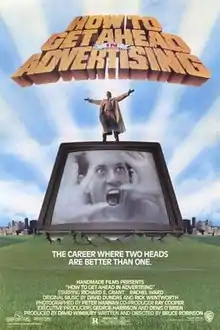How to Get Ahead in Advertising
How to Get Ahead in Advertising is a 1989 British black comedy fantasy film written and directed by Bruce Robinson, and starring Richard E. Grant and Rachel Ward. The title is a pun and can be literally taken as "How to Get a Head in Advertising".
| How to Get Ahead in Advertising | |
|---|---|
 Theatrical release poster | |
| Directed by | Bruce Robinson |
| Written by | Bruce Robinson |
| Produced by | David Wimbury George Harrison Denis O'Brien Ray Cooper |
| Starring | |
| Cinematography | Peter Hannan |
| Music by | |
Production company | |
| Distributed by | Virgin Vision |
Release date |
|
Running time | 94 minutes |
| Country | United Kingdom |
| Languages | English, German |
| Box office | $418,053 |
In the film, an advertising executive has a nervous breakdown and finds himself concerned with the ethics of his profession. In contrast with his moral concerns, a secondary personality manifests itself, being cynical and unscrupulous. A brief struggle between the two personalities leads to the emergence of a third one, but this one is both ruthless and cruel.
Plot
The film is a farce about a mentally unstable advertising executive, Denis Dimbleby Bagley (played by Grant), who suffers a nervous breakdown while making an advert for pimple cream. Rachel Ward plays his long-suffering but sympathetic wife, Julia Bagley. Richard Wilson plays John Bristol, Bagley's boss.
Bagley has a crisis of conscience about the ethics of advertising, which leads to mania. He then develops a boil on his right shoulder that comes to life with a face and voice. The voice of the boil, although uncredited, is that of Bruce Robinson. The boil takes a cynical and unscrupulous view of the advertising profession in contrast to Bagley's new-found ethical concerns. Eventually, Bagley decides to have the boil removed in hospital, but moments before he is taken into the operating room, the boil quickly grows into a replica of Bagley's head (only with a moustache) and covers Bagley's original head, asking doctors to lance it, which is done since nobody has noticed the switch from left to right nor the new moustache.
Bagley, now with the boil head, moustache, and personality (the movie's third personification from Grant after the stressed executive and the raving lunatic) returns home to celebrate his wedding anniversary, with the original head merely resembling a boil on his left shoulder. The "boil" eventually withers but doesn't die, yet Bagley resumes his advertising career rejuvenated and ruthless, although without his wife, who decides to leave his new cruel persona.
Cast
- Richard E. Grant as Denis Dimbleby Bagley
- Rachel Ward as Julia Bagley
- Richard Wilson as John Bristol
- Jacqueline Tong as Penny Wheelstock
- John Shrapnel as Psychiatrist
- Susan Wooldridge as Monica
- Hugh Armstrong as Harry Wax
- Mick Ford as Richard
- Jacqueline Pearce as Maud
- Christopher Simon as Waiter
- Gino Melvazzi as Waiter
- Victor Lucas as Tweedy Man
- Dawn Keeler as Tweedy Woman
- Kerryann White as Girl in Elevator
- Vivienne McKone as Sullivan Bristol Receptionist
- Donald Hoath as Businessman on Train
- John Levitt as Businessman on Train
- Gordon Gostelow as Priest
- Pip Torrens as Jonathan
- Tony Slattery as Basil
- Rachel Fielding as Jennifer
- Pauline Melville as Mrs. Wallace
- Roddy Maude-Roxby as Dr. Gatty
- Francesca Longrigg as Nurse
- Tanveer Ghani as Hospital Doctor
- Joanna Mays as Phillis Blokey
- Sean Bean as Larry Frisk
- Bruce Robinson as the Boil (voice) (uncredited)
Reception
On Rotten Tomatoes the film has an approval rating of 60% based on reviews from 15 critics.[1]
In an interview with Jimmy Kimmel in 2019, Richard E. Grant said that Jim Carrey called him a genius for his work in the film.[2]
The film made £201,972 in the UK.[3]
References
- "How to Get Ahead in Advertising". Rotten Tomatoes. Retrieved 30 September 2019.
- Richard E. Grant on Oscar Nomination, Steve Martin, Star Wars & French Kissing. Jimmy Kimmel Live!. 8 February 2019. Event occurs at 1:07. Archived from the original on 13 December 2021. Retrieved 30 May 2019.
- "Back to the Future: The Fall and Rise of the British Film Industry in the 1980s - An Information Briefing" (PDF). British Film Institute. 2005. p. 24.